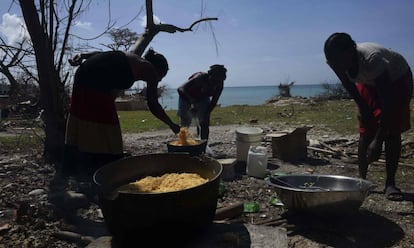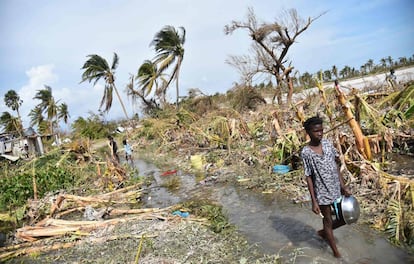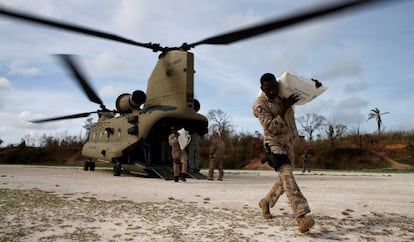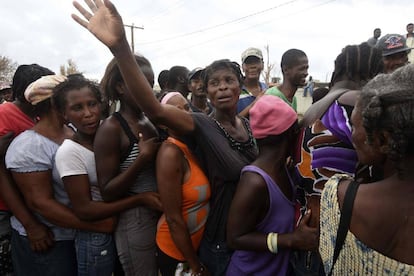Haiti: In the eye of the hurricane
The country is suffering from a deadly combination: earthquakes, bad weather, drought and hunger

Hunger and cholera could lead to more deaths in Haiti than Hurricane Matthew itself. The residents of this country – a place where the perfect storm of adverse meteorological phenomena, hunger, poverty and earthquakes, has brewed – must grieve for the more than 800 people who died as the hurricane ripped through the island, while swallowing the fear of the hunger to come in the next few weeks.
Oxfam, a non-governmental organization (NGO), has called for an urgent response to prevent hunger and cholera from further devastating the country. “Our greatest fear is that the loss of crops and the possible spread of cholera and other diseases will cause more deaths than the actual hurricane over the next days and weeks,” said Damien Berrendorf, Oxfam’s director in Haiti.
We are talking about extremely vulnerable people who have lost absolutely everything Oxfam director in Haiti, Damien Berrendorf
“We are talking about extremely vulnerable people who have lost absolutely everything. They will not recover their livelihoods or reach minimum survival conditions without significantly more support,” he added.
According to the organization, crops and animals have been lost, condemning many to hunger. Most of those affected cannot afford to buy seeds or tools, a challenge that will only prolong and aggravate their suffering, especially since more than 80% of residents in the areas where the storm hit rely on subsistence farming.
In light of these circumstances and given that 2.1 million people, including 500,000 children, have been affected, Oxfam is calling for immediate action from the international community to help mitigate the impact of the hurricane.

“Damage wrought by Hurricane Matthew to roads and power lines in some areas is of the same magnitude as that suffered after the 2010 earthquake. It is important that the big donors start to work as soon as possible,” Berrendorf said.
The other urgent issue is the spread of diseases due to lack of hygiene and clean water. After an initial review of the situation, Oxfam distributed hygiene kits and installed clean water tanks in affected areas.
The NGO is also distributing temporary roofing material as tens of thousands of homes were completely destroyed or damaged.
The organization is working in coordination with local authorities, especially municipal officials and Haiti’s civil protection department, as well as local and international organizations such as UNICEF to speed up relief efforts.

Oxfam Intermón will also deliver three tons of water-purifying equipment to reduce the risk of waterborne diseases and mosquito nets donated by the Spanish Agency for International Development Cooperation (AECID). An AECID charter plane carrying the materials will leave Madrid this week.
The Spanish Red Cross will also send almost six tons of humanitarian aid equipment in the form of plastic tents, mosquito nets, and flexible water tanks paid for by the Valencia regional government, according to a statement published by the organization.
Oxfam Intermón will deliver three tons of water-purifying equipment to reduce the risk of waterborne diseases
The Spanish Red Cross and Dominican Red Cross are coordinating a joint delivery to support the Haitian Red Cross in its efforts to provide clean water and hygiene services.
In addition to its five delegates in Haiti, the Spanish Red Cross also sent two emergency experts to coordinate the delivery of water-purifying tanks from the Dominican Republic.
Before the hurricane hit, the organization used its Disaster Relief Emergency Fund to help the Haitian Red Cross prepare to dispense emergency services including plastic sheets, blankets, cooking kits and water-purifying tablets and deploy more than 3,000 personnel and volunteers throughout the communities in the hurricane’s path.

World Vision, a non-profit aid organization that has been working in the country for 38 years, has said there is a “very high risk” of a cholera epidemic after authorities registered 70 cases in Grand’Anse Department, one of the regions most affected by the hurricane.
The foundation has distributed emergency kits with blankets, tents, water bottles and flashlights, thanks to preparations made before the storm.
“Access to clean water is a serious problem. Pipes have broken in homes, but people can’t leave their neighborhoods to buy clean water,” explained Guy Vital-Herne, communications chief for World Vision Haiti. “In some towns, the water sources have been contaminated. What used to be clean water no longer is, and you can’t always tell by looking whether the water is safe or not,” he added.
English version by Dyane Jean François.
Tu suscripción se está usando en otro dispositivo
¿Quieres añadir otro usuario a tu suscripción?
Si continúas leyendo en este dispositivo, no se podrá leer en el otro.
FlechaTu suscripción se está usando en otro dispositivo y solo puedes acceder a EL PAÍS desde un dispositivo a la vez.
Si quieres compartir tu cuenta, cambia tu suscripción a la modalidad Premium, así podrás añadir otro usuario. Cada uno accederá con su propia cuenta de email, lo que os permitirá personalizar vuestra experiencia en EL PAÍS.
¿Tienes una suscripción de empresa? Accede aquí para contratar más cuentas.
En el caso de no saber quién está usando tu cuenta, te recomendamos cambiar tu contraseña aquí.
Si decides continuar compartiendo tu cuenta, este mensaje se mostrará en tu dispositivo y en el de la otra persona que está usando tu cuenta de forma indefinida, afectando a tu experiencia de lectura. Puedes consultar aquí los términos y condiciones de la suscripción digital.








































